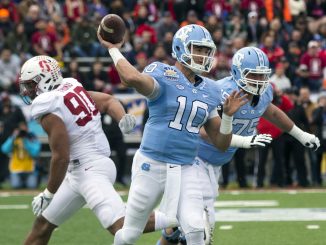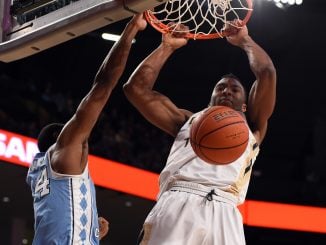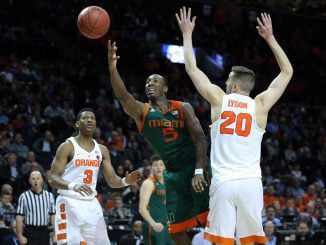
Cancer is something that will touch everyone’s life at some point. For those of us fortunate not to get a diagnosis or a scare, there are friends and relatives who won’t be so fortunate. Shawn Krest has been chosen by the American Cancer Society as one of the Real Men Wear Pink ambassadors for October, which is Breast Cancer Awareness Month. Each day of the month, he’ll be telling a story of how cancer has touched someone on one of the teams we root for. It could be a coach, a player, a retired legend or an arena worker. The disease doesn’t care how successful you are, how much money you have or, as we see in today’s post, whether you gave up risky behavior more than a decade earlier. To join in the fight against breast cancer, you can visit Shawn’s American Cancer Society page.
As Major League Baseball’s playoffs lead toward the drama of the World Series, we look at cancer’s impact on the sport. In part two of a three-part series on the MLB Cancer All-Stars, we continue looking at 15 players who battled cancer while still playing and were able to return to the field.
In the first part, we looked at current players Anthony Rizzo, Jon Lester, Carlos Carrasco and Daniel Norris. Today, we look at two more active players, as well as some big names from the past.
On April 7, the Baltimore Orioles played the New York Yankees in the Bronx. The same two teams met again at Yankee Stadium on Aug. 4.
They were just two of the 19 games that the teams played against each other. Each team won once in the two games, a surprising outcome considering the Orioles were one of the worst teams in baseball this year, while the Yankees advanced to the playoffs.
The games were significant for more than the score, however. Both times, in the first inning of play, Orioles slugger Trey Mancini stepped up to bat against Yankees starting pitcher Jameson Taillon.
They would face each other five times in the two games, with Taillon having the advantage. Mancini went hitless in the five at-bats and struck out three times in one of the rare head-to-head matchups between two members of the Cancer Survivor All-Stars.
“The biggest problems in my life had all been baseball slumps,” Mancini told Sports Illustrated. “I think I’ll enjoy my career even more than I would have if I didn’t go through this.”
“This is gonna sound cheesy, but I’ll never take a day in a big-league uniform for granted,” Taillon said. “That’s for sure.
“There’s not many guys in the cancer club that are in the big leagues,” he added. “So I’d love to catch up with him at some point and just talk about what we’ve both been through.”
Taillon was the first to join the team. While preparing for the 2017 season, he didn’t know what was wrong, just that he was uncomfortable.
Taillon was very familiar with discomfort. As a minor leaguer, he’d gone through major elbow surgery (the infamous Tommy John operation to essentially rebuild the joint) and battled through a sports hernia in back-to-back years. In his rookie year, he was hit in the head by a line drive.
But nothing felt like this. He had nagging groin pain. He suffered from migraines. He was sleeping 11 hours a night and still felt exhausted.
Then he found a lump.
“I’m lying in bed, hand in my pants, watching TV — just like a guy, you know?” he told ESPN. “I just felt something that was really noticeable.”
He found it on May 2 and “started WebMDing, which is dangerous,” he said.
While sometimes, searching the medical site can cause unnecessary worry, in this case, Taillon’s fears were justified. He was diagnosed with testicular cancer and surgery was scheduled.
“Today I lost a piece of my ‘manhood,’” he tweeted after the procedure. “But, today I’m feeling like more of a man than I ever have. My journey hasn’t been the smoothest. But it is my journey, and I wouldn’t change it for anything.”
There were sober moments as well.
“It’s pretty natural to ask something like, ‘Why me?’ Almost in a selfish way. ‘Why did this have to happen to me? Other stuff has happened, too. I deserve a break.’ But life doesn’t really care what’s happened to you,” he said.
He took a week off before he started playing catch. The doctors decided he didn’t need chemo, which expedited his recovery.
For five weeks, Taillon underwent CT scans, MRI’s blood tests and ultrasounds, all while making minor league rehab starts to get back into shape.
His family offered a support network.
“This is not about baseball,” his father advised. “This is about you, about your health and about your frame of mind. If you get out there and find yourself, whether because of the competition or stress, getting tired, we need to shut it down. Right now, you can’t compromise your health.”
His brother Jordan, a surgeon, offered advice and support on a family group text. He also set up a separate group text that didn’t include Jameson, in case family members had questions or concerns that they didn’t want the patient to hear.
Taillon also got support by another Survivor All-Star — pitcher Chad Bettis.
Bettis had just finished his fourth season — recording a career-best 14-8 record with the Rockies in 2016 — when he found a lump. He got his test results in November, while at dinner with his wife to celebrate their first anniversary. She was five months pregnant at the time.
“When you hear those words, ‘You have cancer,’ regardless of what kind it is, it’s a gut check,” he told Coping Magazine.
Bettis had surgery to remove a testicle. Like Taillon, doctors said chemo wasn’t necessary.
“We thought that we’d kind of beat it,” he recalled. Then in a follow-up in March, doctors found it had spread to his lymph nodes. He had 21 rounds of chemo over nine weeks, starting nine days before his daughter was born.
Bettis returned to the field that August. As the two prepared for their comebacks, Taillon worried that they might be moving too fast.
“Dude, screw that,” Bettis texted him. “It’s in your DNA. It’s in your blood. This is who you are. This is what you do. Why would you try to stop that? If it makes you feel better, do it.”
Taillon took the advice and returned two months before Bettis, in June. Bettis was on hand for the game.
Taillon has used his experience to help raise awareness and to help support people just starting on a similar journey.
“I’ve switched from the negative form of ‘Why me?’ to the positive outlook of ‘Why me?’” Taillon said. “What can I do with this? How can I get better and return? What difference can I make going forward? Can I speak out about it? What kind of platform do I have? It’s the same sentence, same words, same order, but two ways of looking at it.”
***
The batter in those Yankee Stadium matchups is closer to the start of his journey: Trey Mancini
In early March last year, Mancini was feeling tired. In his annual physical to start spring training, his iron levels were low, and team doctors decided to perform more tests. They suspected an ulcer or gluten intolerance.
Instead, they found a mass in his intestine. A week later, he had surgery to remove it, and, while he was under anesthesia, the sport shut down due to the COVID pandemic. Six days after that, on his 28th birthday, he received word on the biopsies. The mass was malignant. He had stage III colon cancer.
“You’re not thinking about baseball or anything like that,” he told SI. “You just want to be alive.”
His mother was a former nurse, his father a doctor and colon cancer survivor. But because of the lockdown, neither was able to help him during his treatment and recovery. That fell on his relatively new girlfriend, Sara Perlman, who had been dating him for a few months.
“There were no options,” she told SI. “The nurse came and taught me, and that was it.”
He had chemotherapy infusions every other Monday. The anti-nausea drugs they gave him would usually wear off before he’d arrived back home. He missed last year’s pandemic-shortened season and wasn’t sure if he’d miss more.
“There were times early on when I wasn’t entirely sure I’d be playing baseball again,” Mancini told MLB.com. “I’d be lying if I’d say that was the first thing that came to mind. The whole time I just wanted to be healthy long-term and live a long life. And baseball definitely was on the back burner when I was going through all that.”
His girlfriend, a sports journalist, helped him practice talking about games, in case he had to retire and try to get a job in broadcasting.
“He says ‘um’ a lot,” she said. “So I said, ‘Try to cut that out.’”
Fortunately, Mancini will have more time to practice his post-baseball career. He was able to return to the field for the start of this season and his most recent tests showed no tumor DNA.
He hit 21 home runs this season and had an emotional appearance in the annual Home Run Derby at the All-Star Game.
It hasn’t been the easy, happy ending many might envision, though. He hit his 19th homer at the end of July.
“That was a night where I just really appreciated where I was,” Mancini told the Baltimore Sun. “I was like, ‘Wow, I’m doing maybe even better than I thought I would.’ It kind of set in to me at that moment. And then I woke up the next day, and I’m like, ‘I have [freaking] two more months of this, and I’m tired.’”
He struggled down the stretch, as fatigue got to him.
“I think sometimes he handled cancer better than he handles bad games,” Perlman said.
She gets no argument from him.
“There was no way to really prepare for this,” Mancini told the Baltimore paper. “Ideally, I thought going into this year, I was gonna have this whole new great outlook on baseball and on everything like that and I’d be happy-go-lucky no matter what, but that’s not the reality. That’s not who I am at all. It’s not in my DNA.”
“I was 27 years old two years ago and had a season that I didn’t really think that I could most of my life,” he continued. “I had a great year, and I was really entering my prime. I had a lot of confidence. And I think, a lot of the time this year, I felt like I got that stripped away from me.”
Mancini’s story is a familiar one to longtime Orioles fans. Just about 23 years earlier, another Baltimore star had a very similar bout with colon cancer.
In May 1997, the Orioles were playing in Cleveland, and Eric Davis scored a run.
“I slid into home plate,” he told MASN. “The catcher and I had a nice, little collision and I went to sit down and after the third out, I couldn’t get up from the pain.”
Trainers saw that his stomach was swollen and pulled him from the game. He played the next day, however, then he couldn’t get out of bed. He was taken to the hospital, where doctors gave their diagnosis — a stomach abscess.
He switched hospitals to get a second opinion. Doctors at Johns Hopkins found a tumor the size of an orange in his colon. He had emergency surgery to have it removed, along with about a third of his colon.
Doctors brought up the fact that he’d be having surgery on Friday the 13th. Davis’ response? “I was like, ‘I don’t give a damn about no movie.’
“Actually, I was relieved,” he said. “For six days, I didn’t know what was wrong, so the first thought in my mind was, ‘OK, let’s go take care of it.'”
Doctors had to sell him on getting chemotherapy, but he eventually agreed. He claimed he never felt sick from it and credits the wife of former teammate Eric Anthony, who was a herbalist and steered him toward tea that kept his stomach calm. He frequently ate salads or sandwiches while getting treatment.
He took his infusions in the children’s ward.
“I’m in the ward where 3-, 4-, 5-year-old kids are terminally ill, have no chance of coming out,” he told MLB.com. “Seeing the smiles on their faces and seeing the way they were fighting and all that, it was easy for me. It was very easy. I had lived a long time. To see that with them, that just made my situation that much easier.”
Within days of his diagnosis, he got a call from another MLB survivor—Brett Butler.
While Davis hasn’t met with Mancini, he offered advice to the current Oriole from afar. “I would encourage, for him to keep fighting.,” he said. “He’ll be a part of the cancer family forever, just like I am, and embrace it. It’s not the end of the world. He has a second chance. Embrace it.”
Previous stories in the series include the Carolina Hurricanes’ Stelio Mattheos, Ron Rivera, Brian Piccolo, Brett Butler, Quincy Monk, Anthony Rizzo, Jon Lester, Carlos Carrasco and Daniel Norris. To donate to the American Cancer Society’s fight against cancer, visit the Real Men Wear Pink campaign page.




